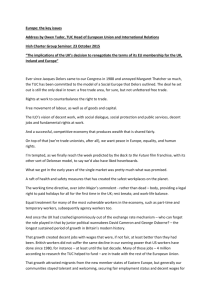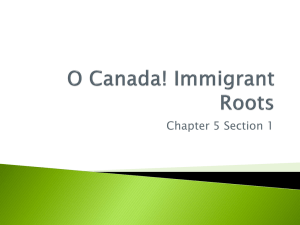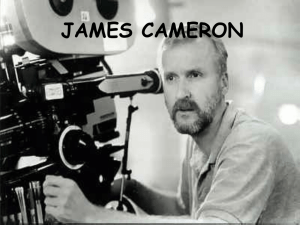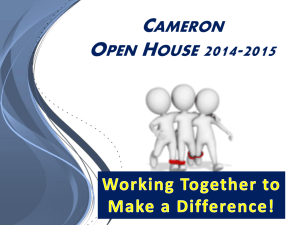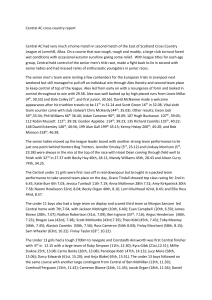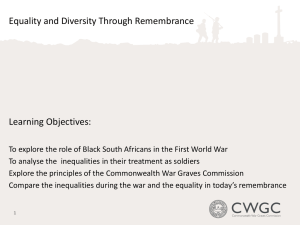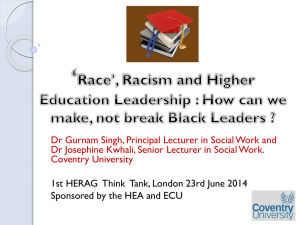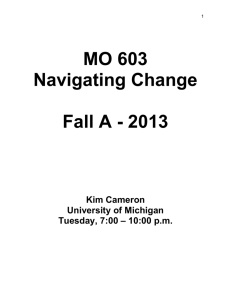David Cameron`s speech on multiculturalsim
advertisement
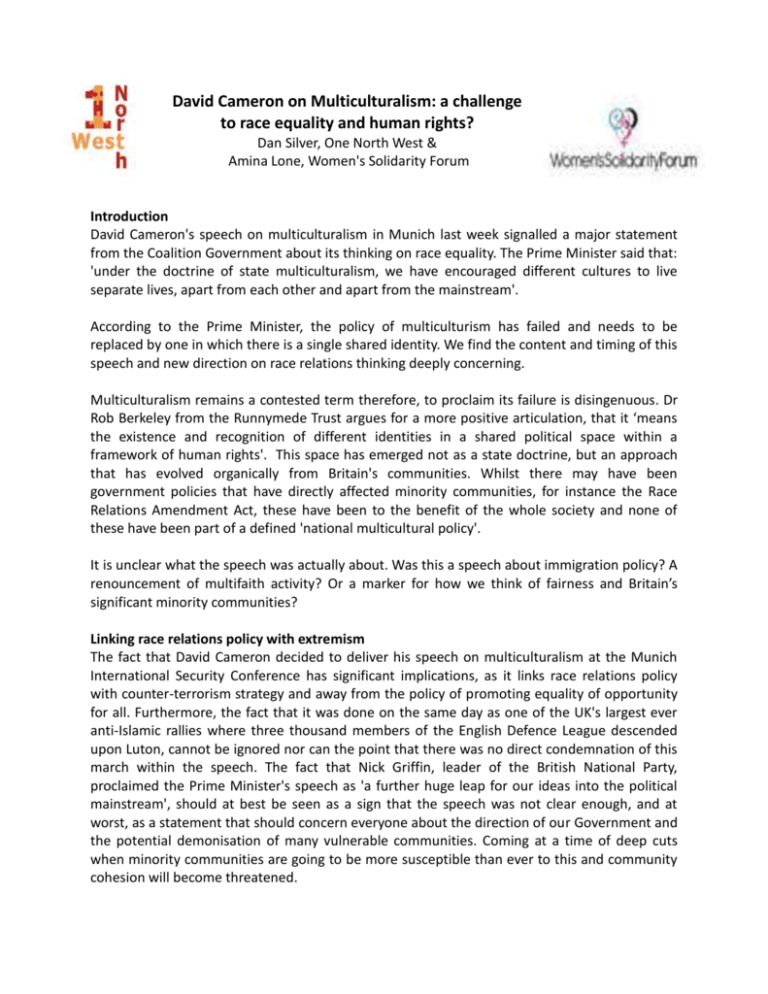
David Cameron on Multiculturalism: a challenge to race equality and human rights? Dan Silver, One North West & Amina Lone, Women's Solidarity Forum Introduction David Cameron's speech on multiculturalism in Munich last week signalled a major statement from the Coalition Government about its thinking on race equality. The Prime Minister said that: 'under the doctrine of state multiculturalism, we have encouraged different cultures to live separate lives, apart from each other and apart from the mainstream'. According to the Prime Minister, the policy of multiculturism has failed and needs to be replaced by one in which there is a single shared identity. We find the content and timing of this speech and new direction on race relations thinking deeply concerning. Multiculturalism remains a contested term therefore, to proclaim its failure is disingenuous. Dr Rob Berkeley from the Runnymede Trust argues for a more positive articulation, that it ‘means the existence and recognition of different identities in a shared political space within a framework of human rights'. This space has emerged not as a state doctrine, but an approach that has evolved organically from Britain's communities. Whilst there may have been government policies that have directly affected minority communities, for instance the Race Relations Amendment Act, these have been to the benefit of the whole society and none of these have been part of a defined 'national multicultural policy'. It is unclear what the speech was actually about. Was this a speech about immigration policy? A renouncement of multifaith activity? Or a marker for how we think of fairness and Britain’s significant minority communities? Linking race relations policy with extremism The fact that David Cameron decided to deliver his speech on multiculturalism at the Munich International Security Conference has significant implications, as it links race relations policy with counter-terrorism strategy and away from the policy of promoting equality of opportunity for all. Furthermore, the fact that it was done on the same day as one of the UK's largest ever anti-Islamic rallies where three thousand members of the English Defence League descended upon Luton, cannot be ignored nor can the point that there was no direct condemnation of this march within the speech. The fact that Nick Griffin, leader of the British National Party, proclaimed the Prime Minister's speech as 'a further huge leap for our ideas into the political mainstream', should at best be seen as a sign that the speech was not clear enough, and at worst, as a statement that should concern everyone about the direction of our Government and the potential demonisation of many vulnerable communities. Coming at a time of deep cuts when minority communities are going to be more susceptible than ever to this and community cohesion will become threatened. Encouraging Islamophobia The apparent linking of the supposed failure of multiculturalism on to one religion could be seen as placing the burden of blame onto Britain's Muslim communities. Rather than highlight the many positive examples of multicultural communities that Cameron could have shared in his speech, he instead choose to focus on a small minority of disaffected people from one community. This lack of belonging is as true for the hundreds of young men who drift aimlessly into the EDL as it is for those who drift into a radical hatred of the West. By portraying Muslim communities as the scapegoat for the failures of 'state multiculturalism', David Cameron has done lasting damage to the cause of social cohesion that he professes to promote and leaves himself open to the challenge that the Government is focusing on the Muslim community in order to deflect attention away from the unpopular policies and cuts in public spending that are emerging. Contradictions David Cameron argues that 'instead of encouraging people to live apart, we need a clear sense of shared national identity that is open to everyone.' which will be achieved through 'muscular liberalism'. However, the contradictions and lack of clarity in David Cameron's speech could suggest that the Government is unclear about what it actually means: On the one hand the Prime Minister speaks of a lack of integration and a single common vision, whilst at the same time, Government education policy promotes 'Free Schools', of which four of the nine recently announced are faith schools. With no common framework for these 'Free Schools' to adhere to, there are no safeguards to ensure that they will be teaching a shared vision of Britain. Therefore, this flagship policy of the Government could potentially serve to contribute to the very problem that David Cameron has identified that we need to solve. According to David Cameron, one of the practical ways in which a ‘single shared identity’ could be achieved was 'making sure that immigrants speak the language of their new home and ensuring that people are educated in the elements of a common culture and curriculum.' At the same time Government has announced a cut to funding for English Speakers of Other Languages. Under the new measures announced, places will be limited to learners who are actively seeking work. For those receiving other benefits, such as housing benefit, income support or tax credits – who are all currently eligible – free places will not be available. Learning English has been proven to have a positive impact on the lives of individuals, families and society as a whole. It affects the ability to access services, to contribute to community life and participate in local groups and is essential for secure employment and community cohesion. This means that people who are disproportionately affected by Government policy are likely to become targets for attacks, whilst also threatening the development of our society and efforts to come out of the economic crisis that we find ourselves in. Big Society David Cameron offers his vision of Big Society as a further solution, promoting ‘meaningful and active participation in society, by shifting the balance of power away from the state and towards the people'. One North West has worked with over one hundred and twenty Black and Minority Ethnic voluntary and community sector organisations to highlight inequalities in this agenda, which are still yet to be addressed. These include the marginalisation of under represented communities, in particular BME women and the new public service delivery model which could have a disproportionate effect on the BME voluntary and community sector, which is vital to delivering essential services for our most disadvantaged communities. The Big Society vision ignores the central need to tackle social and economic inequalities, disparities which are due to become wider as a result of the Government's cuts to public sector spending; indeed, it could be argued that the speech on multiculturalism is part of a wider policy of placing the burden of the economic crisis on our most vulnerable communities. Race Equality The view espoused by David Cameron that blames problems around race on the lack of integration from minorities, fails to acknowledge the persistence of race inequality within our society, inequalities that are due to historical structural factors and institutional racism. In the North West this is evident in an employment gap of twenty-nine percent between BME women and the rest of the population and a concentration of BME communities in areas of multiple deprivation. Whilst nationally, figures such as the fact that only 0.8% of local councillors are women from BME backgrounds and the disproportionate application of Stop and Search to young people from Asian and Black backgrounds, tells its own story. This is fully evidenced in a major report by the Equality and Human Rights Commission, which revealed that an ethnically diverse Britain remains deeply unequal.. The commission's first three-year review entitled, 'How Fair is Britain', shows that race remains the key area of inequality within the UK. By ignoring these inequalities rather than addressing the complex issues in our society, David Cameron and the Coalition Government will set back human rights and cohesion in our communities and fail to deliver improvements for our disadvantaged communities. Final Thoughts David Cameron argues that we need to get to a point where people say; ' Yes, I am a Muslim, I am a Hindu, I am Christian, but I am also a Londonder or a Berliner too’. We believe that we are already at that point. Far from articulating a policy that will take us further along that road, David Cameron's recent speech has in fact undermined this and will widen inequality and weaken our commitment to human rights in the UK. This signals a move away from a policy of race relations that promotes equality of opportunity, cultural diversity and tolerance and towards one of monoculturalism and assimilation, where race equality becomes part of counter-terrorism strategy and inequalities in our communities become further entrenched. We live in a culture which is ever evolving, fluid and will change with the needs, expectations, and norms of each generation. We believe that the national agenda should be about ensuring and creating shared space in our streets, in our communities, in our schools, and most importantly, in our values. For many communities where Britain is our home, it is just that, our home. This is our shared space, with our values, our hopes and our dreams. This vision promotes a sense of respect, solidarity and dignity for all which is one that One North West and the Women's Solidarity Forum supports and will continue to work towards. For more information please email danielsilver@nwnetwork.org.uk or aminalone@hotmail.com or visit: www.onenorthwest.org.uk


